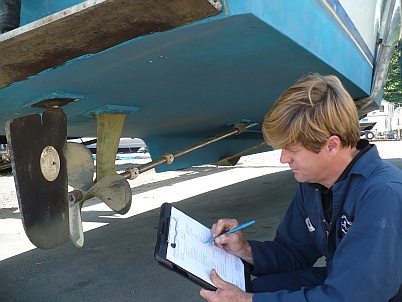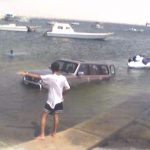In days of yore and wooden ships bobbing like tinderboxes across the briny, Charley Noble stood tall in the galley, awaiting the next taste of hot flame that would dance across his belly from the stove bolted below him.
Who was this Charley Noble, this iron-chested hulk that kept vigil in the galley while the crew busied themselves above decks getting ready for a new day or preparing to bring the day to a close?
Charley Noble was the sailors’ name for the galley chimney, which drew the heat from the galley stove and carried it safely above decks and into the passing ocean breeze. As you can imagine, sparks and hot embers coughed through the decking from Charlie’s gaping mouth represented an extreme hazard to those old wooden behemoths, and so it was the responsibility of the cook to keep Charlie clean and free of soot and tar. Thus, every cook had a periodic routine established for firing a pistol up the pipe to loose the soot. That practice was known to all as “shooting Charlie Noble.”
Charley had to be cleaned out and “refreshed” occasionally, for the lives of all on board depended on it. But so it was true for all fixtures aboard the ships. In a manner of speaking, even the helmsman, navigator and mate gathered soot as their days on the sea wore on, learning bad habits, or taking dangerous shortcuts, or becoming lax in their duties. And somewhere along the way, someone had to shoot their Charley Nobles to get them back on track. For just as Charley Noble’s soot represented a hazard to the ship and crew, so did the soot of disregard and inefficiency on the part of the crew place the ship at risk.
I guess we all need to shoot our own Charley Nobles from time to time. We develop bad habits (soot), we take unnecessary risks (soot), and we let our guard down and become lax (soot). We fail to make sure our crew and passengers have properly fitted PFD’s (soot), we don’t recharge and inspect our fire extinguishing equipment (soot), and we cut a little too close to that other boat in that narrow channel (soot). We know better, but we’ve just gathered a little soot. And in doing so, we become a danger to the folks on our vessel and the kids waving to us from the boat that just passed.
It only takes a few minutes before each cruise or trip to see if soot may have built up around us. All we have to do is ask ourselves some questions about our preparedness.
For example, how long has it been since we checked the expiration date on our visual distress signals? Expired = soot.
Have I pulled hard on the straps of our PFD’s lately to see if any of them tear the surrounding fabric or break the seams? Any soot here?
What about our fire fighting equipment? Lots of “soot” builds up here when those inspection tags don’t have notations for months or years, or the nozzles are plugged with spider webs.
And talk about soot! If you’ve got an inboard gasoline engine, run your fingertips across those little fin things on the outside of the backfire flame arrestor, beneath what probably looks to you like a car engine air cleaner. Greasy? Time to shoot Charley.
Frayed lines? Light bulbs? Sound devices? Bilge pump? Good shape and in great working order, or sooty?
How about the rails and deck fittings? Tight and safe, or sooty? Ever see someone lean on a rail and follow it into the water? It’s about as funny as stubbing your bare toe on the sharp edge of a loose screw in a deck fitting. It isn’t funny or pretty. Loose means soot.
I’ll bet you can dream up a whole bunch more places on your boat that can accumulate soot. When you find it, you should get rid of it. And when that’s all nice and shiny, take a look at your own boating skills. If they’ve got some soot build-up, take a refresher boating course and polish those skills to a high luster.
Nobody ever complained when the cook shot Charley Noble, back in the days of yore and wooden ships. They knew the chances were lessened that they’d be spending the night with the sharks while their ship burned. It’s that peace of mind you get when you know that somebody has gone out of their way to help make you safe. Somebody like you, Captain.








